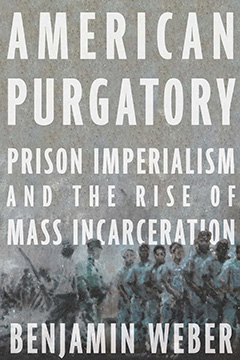“American Purgatory shows how racialized criminalization and incarceration have been the key mechanisms of state building at home and imperialism abroad.”—George Lipsitz, author of The Possessive Investment in Whiteness |
“A detailed and passionate account of the practice and responses to U.S. prison imperialism in the past that serves as an intellectual grounding for those engaged in the unfinished work of decolonization.”—V.P. Franklin, Distinguished Professor Emeritus of History and Education, University of California, Riverside |
“An important contribution to strengthening our prison abolition and anti-colonial movements and our refusal to be defined by criminalization.”—Pam Fadem, California Coalition for Women Prisoners |
“American Purgatory is the sort of book reactionary politicians and organizations are trying to ban. It’s full of evidence that many of the attitudes and conditions prevalent in this country from its founding were racist, bigoted, even genocidal.”—The Arts Fuse |
“Historian Weber connects the histories of mass incarceration and American imperialism in his wide-ranging and innovative debut. . . . It’s an eye-opening and fresh perspective on a pair of hot-button issues.”—Publishers Weekly (starred review) |
“Masterfully researched and written, American Purgatory takes the history of mass incarceration to an entirely new level, as it connects centuries of American expansion and conquest on the North American continent and overseas to the planning logics and actual practices of prison systems. Benjamin Weber’s global perspective on ‘prison imperialism’ as well as prisoners’ resistance has produced a field-defining book.”—Evelyn Brooks Higginbotham, Harvard University |
|
“A must-read, American Purgatory makes clear that truly understanding the depth of today’s carceral crisis means recognizing it as a global apparatus—one that has always informed how this nation maintains white supremacy as well as manages acts of resistance and self-determination not simply within its own borders, but around the world.”—Heather Ann Thompson, Pulitzer Prize–winning author of Blood in the Water |
“An international history of the U.S. prison problem, guided by the voices of those who never let captivity break their global freedom dreams.”—Dan Berger, author of Stayed on Freedom |
“A timely consideration of the geopolitical role of American prisons.”—Kirkus Reviews |
“American Purgatory seeks to unite the history of the prison, the history of slavery, and the history of American empire, arguing that they are bound together by carceral violence and by the resistance to it. The climb out of the American purgatory is at least as steep as Dante’s mountain, with no guarantee of reaching Paradise. But we have Weber’s book, a more comprehensive map than any yet made, with paths upward marked out by those whose knowledge was earned by hard experience.”—Los Angeles Review of Books |
“American Purgatory is a tour de force that brings together the history of racial exploitation and colonialism over four centuries, as well as the various forms of opposition that consistently emerged in response to punitive developments. In doing so, Benjamin Weber provides a critical new framework that can help us envision a more equitable and just world.”—Elizabeth Hinton, author of From the War on Poverty to the War on Crime |
“This outstanding book exposes the surprising connection between America’s current age of mass incarceration and the imperial prisons of the past. Showing how racism and colonialism shaped government efforts to incapacitate people who resisted the incursions of U.S. foreign policy, Weber highlights the urgency of understanding the relation between decolonization, antiracism, and the possibility of prison abolition.”—Vincent Brown, author of Tacky’s Revolt |
|


